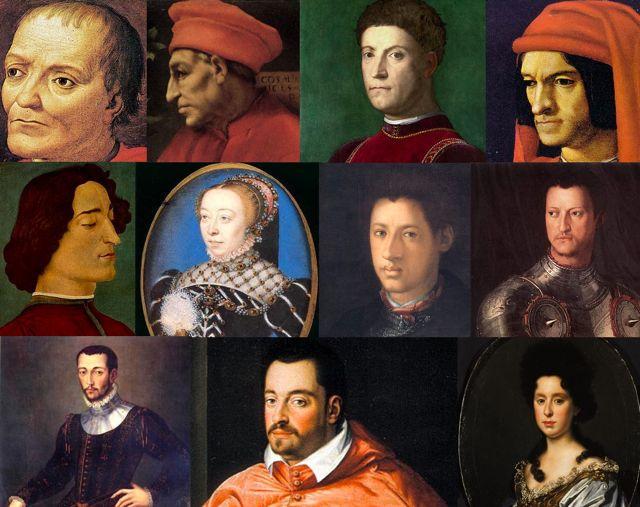Greek philosophy is booming today, with everyone from Silicon Valley bros to NFL teams studying the words of the Stoics. We can largely thank the Medici family for this.
In the 1400s, Greece and its great works were walled off from the west. The Medici family was at the time building a banking fortune in Florence and making a series of brilliant political chess moves that made them de facto rulers of the city. One of those moves was to fund the translation of works by Plato, Epictetus, Hippocrates, Galen, and Homer. This brought the scholarship westward and, eventually, to us all.

But, like the philosophers they rediscovered, the Medici provided a blueprint for modern living. The impulse that led them to uncover scholarly work was part of a larger mission related to personal and professional growth and leadership—one in which they saw themselves as an important part of a much larger system. The Medici would go on to be one of the most powerful families in history. Their tactics can still help you get ahead today.
Say “yes” more than “no”
Cosimo de’ Medici was just another businessman until he established an elaborate favor network in the early 1430s. He focused on doing good turns for Florence’s businessmen, politicians, and religious leaders. Within a few years, everyone of influence in Florence was beholden to Cosimo. Even the pope, to whom Cosimo gave large and favorable loans.
This tactic helped Cosimo run Florence behind the scenes, becoming, as Pope Pius II said, “king in all but name.”
“Say ‘no’ more often,” is currently a popular piece of productivity advice. But new science conducted in the Netherlands backs theMedici technique of saying “yes.” The researchers discovered that when we do a favor for someone, the person is left with two conflicting emotions: the negative emotion of indebtedness and the positive emotion of gratitude. The former, unsurprisingly, tends to compel the person to assist us later. The latter makes them more likely to have our back and consider us a friend. (Paradoxically, this second phenomenon works both ways: The Benjamin Franklin Effect suggests that we also start to like the person we’ve helped.) Florence’s heavy hitters didn’t just owe Cosimo, they also allied with him, solidifying Cosimo’s power.
The Dutch researchers found that our favors don’t have to be massive for us to see a return. Study participants who received a small favor reported feeling equally grateful and obligated to reciprocate as did the ones who received a big favor.
It doesn’t take much to help someone. Obviously, the higher one’s ranking in a company or organization, the harder it becomes to say “yes” to everyone. But a good guideline is this: If a favor takes only a couple of minutes, help the person out. Our actions will win us an ally and may pay off later on. Plus, it feels good to help others.
Work for others—and yourself
Groundbreaking research from a team of scientists at Florida State, Stanford, and the University of Minnesota called into question decades of psychological scholarship when it drew a line in the sand between happiness and meaning. The two are interrelated. But the scientists showed that while satisfying our own needs leads us to happiness, it won’t necessarily lead us to meaning.
The opposite is also true: Helping others gives us meaning in life but doesn’t necessarily make us happy. Having an extreme of either can be dangerous. Consistently putting others first, the researchers say, increases stress and anxiety, while regularly putting ourselves first can lead us to live a joyful but rather shallow life.
The Medici understood that satisfaction and power come from putting ourselves and others on an equal playing field. The family was swimming in money. But historians point out that there were plenty of other rich families in Florence at the time. Those families have all been long forgotten.
The Medici endured because they used much of their time, money, and influence to bolster the republic of Florence. Medici fortunes financed beautiful projects like Saint Peter’s Basilica and Santa Maria del Fiore (the Duomo). They lent money to the government for public works projects. They boosted societal well-being by commissioning stunning public art, monuments, and libraries.
In 1974, the historian Hugh Ross Williamson wrote a biography of Lorenzo de’ Medici, who was Cosimo’s grandson. Williamson wrote that Lorenzo would: “[N]eglect no opportunity of protecting, increasing, adorning and raising this city, but was always ready with counsel, authority and painstaking, in thought and deed; shrank from neither trouble nor danger for the good of the state and its freedom.” The people of Florence—from the dirt poor to the filthy rich—experienced better access to public services, a stronger economy, and greater well-being. The Medici, meanwhile, could wield more influence.
Surround yourself with beauty
The Medici nearly single-handedly took Europe out of the Dark Ages and ushered in the Renaissance, a period perhaps best known for its art. The family funded the greatest works of Botticelli, Leonardo da Vinci, Michelangelo, and Raphael. We can even thank the Medici for the invention of the piano and opera.
Their efforts resulted in a more beautiful Florence—which also made for a more productive Florence. Researchers in the U.K. found that people who worked in offices with interesting art were 17% more productive and had fewer health complaints compared to workers in minimalist offices. When employees could choose the art inside their workspace, their productivity jumped 32%.
Many of us are now working from home more often and saving money for it. Less commuting, buying lunch out, etc. Why not invest some of that money into a more visually compelling workspace? The U.K. research—and enduring legacy of one of the most powerful political dynasties in history—suggests that it’ll pay itself back.